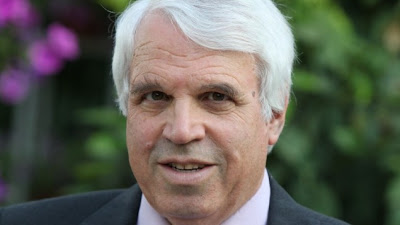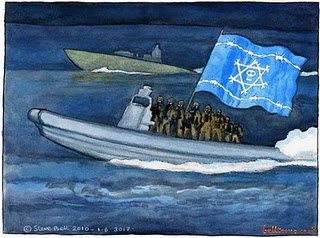The Clock is Ticking on the Zionist Dream
It comes to something when those few Zionists and Israelis who are sincere about withdrawing from the Occupation of the Territories accept the need for a boycott of West Bank settlement produce. Not that I believe you can draw a distinction any longer, but in supporting not only a boycott of settlement products but also Israeli cultural products, Alon Liel shows how the BDS campaign, in less than a decade, has become a viable instrument in the hands of the opponents of the Apartheid State.
Of course there will be those who buckle under the strain and remember their liberal credentials about not mixing politics and culture. Others, like Norman Finkelstein, will hark back to their Maoist background and believe that nothing is now possible except the unattainable 2 state solution.
But what is most significant is that Alon Liel is not just another Zionist but a former Director-General of Israel’s Foreign Ministry and a former ambassador to South Africa. When people like him, the political elite, start getting cold feet then the writing is on the wall.
However for that to happen the Palestinians themselves have to get their act together. Firstly they need to rid themselves of the Quisling Regime in Ramallah and those who believe that human knowledge began and ended 1400 years ago in the middle of the Arabian desert.
Secondly they need to link up and indeed inspire the revolutions in the Arab world. Without liberation in the Arab East there can be no Palestinian revolution. A Palestinian equivalent of the ANC is a sore necessity, not the husk that is the PLO.
Tony Greenstein
Ex-Foreign Ministry director backs cultural boycott of Israel
Citing ‘complacency about the occupation,’ Alon Liel supports Alice Walker’s refusal to have book translated into Hebrew; Diplomatic officials: He’s a lightweight
 |
| Alon Liel served as the Foreign Ministry’s director-general from November 2000 until April 2001 (photo credit: courtesy) |
By Raphael Ahren June 27, 2012, 5:08 am 29
A former top Foreign Ministry official has endorsed South Africa’s plan to ban “Made in Israel” labels for imported products from the West Bank, protesting what he calls Israeli complacency about the occupation.
Alon Liel, a former Foreign Ministry director-general and ex-ambassador to South Africa, told The Times of Israel that he also personally boycotts products from West Bank settlements and supports cultural boycotts of Israel to protest the lack of progress in the peace process.
Liel said his stance, which includes supporting author Alice Walker’s refusal to have her book “The Color Purple” translated into Hebrew, also aims to call attention to the urgent need for Jerusalem to ensure the near future brings “Palestinian independence, not an Israeli apartheid state.”
“I can understand the desire, by people of conscience, to reassert an agenda of justice, to remind Israelis that Palestinians exist,” Liel wrote in an article that appeared Sunday in the South African BusinessDay newspaper. Similar versions of the article also appeared in various European newspapers, including the French Liberation.
“I can understand small but symbolic acts of protest that hold a mirror up to Israeli society. As such, I cannot condemn the move to prevent goods made in the occupied Palestinian territory from being falsely classified as ‘Made in Israel.’ I support the South African government’s insistence on this distinction between Israel and its occupation,” Liel wrote.
Foreign Ministry spokesman Yigal Palmor responded that Liel is entitled to his personal political opinions. “The Foreign Ministry naturally does not comment on political views by politicians or by individuals, even if they used to be members of the diplomatic corps,” Palmor said Tuesday.
‘Boycotting products from Israeli factories in the settlements, is a kind of wake-up call’
On May 1, South African Trade and Industry Minister Rob Davies said he intended to issue an official notice “to require traders in South Africa not to incorrectly label products that originate from the Occupied Palestinian Territory (OPT) as products of Israel.” Davies said that Pretoria recognized the State of Israel “only within the borders demarcated by the United Nations (UN) in 1948” and that these borders do not include territories occupied by Israel after 1967.
Davies has invited “comments from the public on this issue,” which must reach the ministry by June 30. Several Jewish and pro-Israel groups have written to the Trade and Industry Ministry protesting the plan, but the ministry did not respond to a Times of Israel query as to the status of the proposal.
The Israeli Foreign Ministry slammed Davies’ plan, saying it “smacks of racism” as it singles out Israel while ignoring hundreds of territorial disputes across the globe.
But Liel, who served as the ministry’s director-general from November 2000 until April 2001, said it was “ridiculous” to accuse the government in Pretoria of racism. “The South Africa of today is the number one democracy in Africa, its constitution is an example to all African countries and is studied all over the world,” he told The Times of Israel. “Mandela is still alive and the ANC [African National Congress], which toppled apartheid, is still ruling the country. To use that term, racism, for the government that toppled apartheid is very counterproductive.”
Liel is not the first former Israeli ambassador to South Africa to criticize Jerusalem’s reaction to the labeling proposal as exaggerated. Veteran diplomat Ilan Baruch — who last year resigned from the Foreign Service because he felt he could no longer represent the government’s policies — wrote in an op-ed that “not every label is a libel.”
According to a diplomatic source, the Foreign Ministry deliberately slammed the labeling proposal as racist in response to various instances in which Pretoria misbehaved toward Israeli officials. Such incidents include racist insults against a dark-skinned Israeli, refusing to meet with Israeli and Jewish groups over the labeling issue and lying to the press about the proposal, the source claimed. The source also said that the fact that Israel’s harsh comments did not cause an outcry among South African opposition parties “showed that we were on to something.”
Liel, who was Israel’s ambassador in South Africa from 1992 to 1994, says he has the necessary background to understand Pretoria’s plan to label West Bank products, and that it was worthy of Israeli support.
“If nobody speaks about the [Israeli-Palestinian] conflict, nothing will happen. I think that such a move, boycotting products from Israeli factories in the settlements, is a kind of wake-up call,” Liel said. “For me, this wake-up call can come from any direction, but somebody has to wake up. If the wake-up call is in this form, fine with me. If there will be another wake-up call, also fine. But such a non-violent wake-up call is needed.”
‘We’re very close to the point where a Palestinian state will become impossible. If we pass this point we’re going to be an apartheid state’
Liel also said he principally supported cultural boycotts of Israel, such as author Alice Walker’s recent refusal to allow a Hebrew translation of her bestseller “The Color Purple” in protest of Israel’s “persecution of the Palestinian people.” “I think it’s needed, yes,” he said. “Unfortunately, I don’t see Israeli politicians waking up from these calls. But it’s better than nothing.”
The former diplomat, who is closely affiliated with former left-wing MK Yossi Beilin, said he starting avoiding products from the West Bank about three years ago, after he realized that the peace process with the Palestinians was going nowhere and that most Israelis were complacent about the status quo.
“It’s a symbolic thing,” Liel said. “I just want to make a point, that we’re sitting on an enormous amount of explosives and that we are probably at a critical point regarding the possibility of establishing a Palestinian state. We’re very close to the point where this will become impossible. If we pass this point we’re going to be an apartheid state and I don’t want to live in an apartheid state.”
A diplomatic source said Liel’s opinions shouldn’t be given too much importance. While the 64-year-old is respected for being “dedicated and very intelligent,” he is considered a “lightweight” among Foreign Service veterans, the source said. “He was the foreign ministry’s director-general, that’s true, but only for a few months. He didn’t leave any real legacy behind, and so his opinion should be seen for what it’s worth.”
